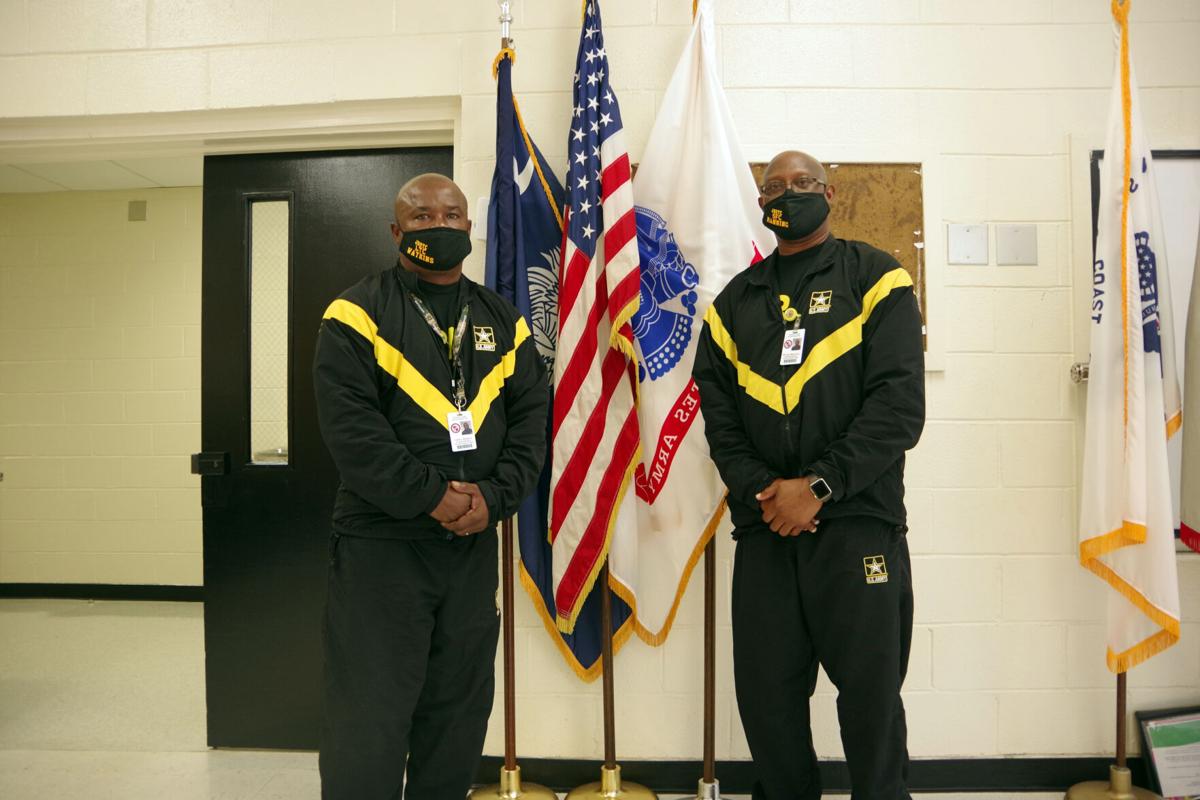Feature photo: Lt. Col. Jeffery Watkins (left) and Sgt. 1st Class Michael Manning teach JROTC at Hannah-Pamplico High School.
PAMPLICO, S.C. — Lt. Col. Jeffery Watkins and Sgt. 1st Class Michael Manning are no strangers to the Pee Dee, and now, several months into the school year, they’re no strangers to the JROTC students at Hannah-Pamplico High School.
The two Army veterans and retirees came to H-P from other Pee Dee schools — Watkins from Timmonsville and Manning from Lake City.
Columbia native Watkins graduated from Spring Valley High School then Benedict College before serving 23 years in the U.S. Army — mostly in infantry and combat arms.
“After 23 years, as a lieutenant colonel, I decided to call it quits and continue my career (as a JROTC instructor), because I went through JROTC, and I wanted to give something back,” Watkins said. “Every day I see myself in these seats.”
He moved to H-P after the JROTC program at Timmonsville High School ended.
Manning, a Dillon native and Dillon High School graduate, retired after 20 years in the military as a sergeant first class and taught JROTC for 17 years in Lake City before he went looking for a change.
“I knew Sgt. (1st Class Stormey) Gillens real well. We talked a lot, and he was explaining to me about over here things were different and I was looking to move,” Manning said. “I applied, talked with the superintendent and thought it was a good fit for me, so I came over and I’m enjoying it.
“As you can see, between the both of us we have quite a bit of time doing this.”
Both arrived at a time when all instructors were adjusting to teaching in a time of COVID-19, and it was no different for them.
Watkins said they’ve taken the lessons online through Zoom, email and social media.
“This is our lifeline,” Watkins said.
Moving instruction online has done two things — made the instructors available to the students 24/7 and served to highlight that one of the primary roles played by all JROTC instructors is one of role model.
“I think we set that example well,” Manning said.
“They see us. We give them that foundation. When you take JROTC in reference to other classes, they act a little differently when they come to JROTC; it’s more respect,” Manning said. “We demand that stuff, and they can understand it and in return they respond better.
“If you have a strong foundation, the rest of your building is going to be OK.”
Watkins said much of what the students learn in the JROTC classes just reinforces lessons from other classes along with life -skills they’ll need to be successful moving forward.
That includes personal hygiene, talk about drugs, using “yes, sir” and “no, sir” and just making themselves available for the students, Watkins said.
Beyond taking some classwork online, other issues presented by the COVID-19 pandemic include JROTC-issue masks that were sewn backward and had to be returned, and the school is awaiting replacements.
The school’s color guard has been sidelined by the virus, parades are out as is just about every other activity that isn’t class, physical training or related directly to those two.
“Our chain of command is trying to do this safely. That’s why we’re not doing any activity at all because we don’t want to add to the problem,” Watkins said. “Our job is to make sure we keep these kids healthy.”
Manning said, “It’s a different time for us, the whole country and the whole world. We have a test that we take and about every five or six weeks, we take a cadet challenge. When we’re outside running six feet apart, they can take their masks down. When we’re close up, they have to have their mask on.”
But this year, the most important lesson the students will have to learn is a life lesson that won’t appear as a question on any test, but it is the answer to so many of life’s tests.
“In America, we have to keep it going,” Watkins said. “We can’t give up. We have to keep fighting.
“Keep these kids going with hope. I don’t know how they’re living at home, I don’t know how they’re doing — we’re just trying to keep it going. That’s all we can do. We can’t let these kids get down.
“Nobody will ever forget 2020. Everybody is adapting to this. You just can’t take it head on.”




